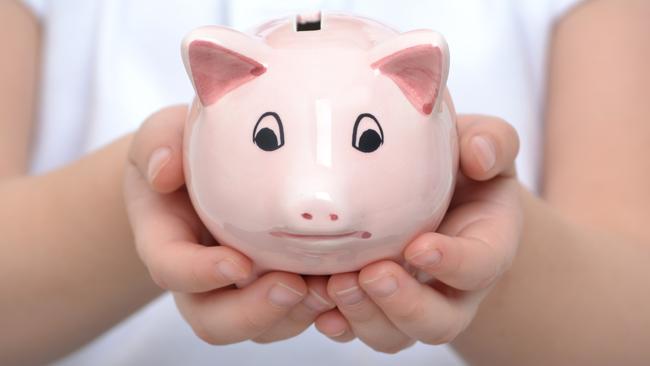Barefoot Investor: Children lose out when banks win
FINANCIAL education is an essential life skill children must learn and it’s far too important to be left to a bank’s marketing department, writes Barefoot Investor.

Barefoot Investor
Don't miss out on the headlines from Barefoot Investor. Followed categories will be added to My News.
L ANIE ASKS: My kid’s school is considering school banking, and someone suggested Dollarmites.
I bit my tongue while screaming NOOOOOO inwardly. I want to attend the next meeting armed with my Barefoot “bible” and strong arguments against Dollarmites, but I also need to supply an alternative.
Someone else suggested school banking with Bendigo Bank, but what would you suggest? I want to educate our kids about finance, not set them up for financial ruin.
BAREFOOT REPLIES: As Jenny from The Block would say, “You go, girl!”
If I was at your P&C committee, here’s how I’d lay out the argument.
First, let’s look at this from the school’s perspective.
The CBA has said that it pays the average school $400 a year in kickbacks. That’s a great deal for the bank (after all, bank tellers get bonuses for signing up accounts). Yet it’s a crummy deal for even the most cash-strapped school. Second, let’s look at it from the perspective of the parents, who are the ones putting the money in.
The CBA Youthsaver account pays a pretty attractive 2.29 per cent per annum (*).
* Welcome to banking! If you fail to make at least one deposit a month, or if you make even one withdrawal, you’ll get a not-so-attractive 0.01 per cent. And if you forget about the Dollarmite account after a few years (which you will do), you’ll actually end up losing money when you account for inflation.
Finally, let’s look at it from a kid’s perspective.
Financial education is a core life skill that every child will be tested on every day of their adult lives.
It’s far too important a subject to be left to a bank’s marketing department.
In fact, financial education isn’t about opening a bank account … or even much about money. It’s about teaching values. It’s about raising resilient, hardworking, responsible and generous kids. So, Melanie, what would I suggest? Hold off till next year. Why?
Because I’m in the very, very early stages of writing my next book … which is all about teaching kids good old-fashioned money values and skills.
And I’ll be taking it to schools — no kickbacks, no bank accounts and no dancing mascots.

M ONEY OR THE BOX?
JENNY ASKS: I am typing this at 2am — I cannot sleep. My husband and I have a household income of $200,000 and have three small kids — but we never see them, as we work in the city and live 60km away. The three-hour daily commute is taking its toll on us all. The house is great, and affordable, but a long way from work. Yet moving to a house big enough for all five of us that is close to the city would put us into mortgage stress. We are stuck — what do we do?
BAREFOOT REPLIES: Do you want the money or the box?
On one hand, a study from a university in Sweden found that relationships where one partner commutes longer than 45 minutes are 40 per cent more likely to end in divorce.
On the other, Deakin University Emeritus Professor Robert Cummins and his team have found that financial insecurity (read: mortgage stress) produces similar feelings to that of physical torture.
And you’re stuck in the middle!
Or are you? You see, it may not feel like it — especially at 2am — but you do have choices.
You can choose to ditch your commute and seek out jobs closer to home — even though they’re likely to pay less. (Perhaps one of you could try this option while the other continues to commute.)
Or you can choose to spend less, and spend more time with your young kids. This is what I’d work to if I were you.
Besides, the proof of the pudding is in the eating: the Australian Wellbeing Index has repeatedly shown that people living in regional Australia (Woop Woop!) are among the happiest people in the country.

N OT IMPRESSED
AMANDA ASKS: I am 35 and engaged to the most generous guy, who I love. But we have spent $31,000 in two months!
We earn $330,000 p.a. combined and have equity of $850,000 in our two properties, which we will sell next year so we can get a nice home with a small mortgage.
Recently I did an audit and found we had spent $31,000 on … nothing! Meals out, weekends away, events at home, clothes, bond, removalists, some double rent for a period. I want to be debt-free in five years. Kick us up the pants!
BAREFOOT REPLIES: Honestly, on your income you probably don’t need a kick up the pants — you’re going to be fine ...
… so long as you continue earning $330,000 a year.
But if the money dries up, things can go into reverse pretty quickly.
It’s a three-step trap that I’ve seen plenty of high-income earners — doctors, lawyers, footballers — fall into:
First, buy expensive toys (boats, cars, and cash-draining McMansions).
Second, spend like a Kardashian — and only invest in money-losing ventures that “lower my tax!”
Third, get hit with one of the big Ds: divorce, disease, disability … or a downturn where you lose your income.
It’s more common than you’d think: recent research from Digital Finance Analytics (DFA) found that 30,000 households living in wealthy suburbs such as Sydney’s Vaucluse (median price $4.5 million) and Melbourne’s Brighton (median price $2.6 million) are at risk of defaulting on their debts.
Truth is, wealth isn’t what you earn, it’s what you save.
You want to impress me?
Don’t humblebrag about the $31,000 you’ve peed into your Prada handbag over the past couple of months.
As financial philosopher Shania Twain says, “That don’t impress me much”.
Instead, buy a house you can afford, pay it off, then show me your plan for how you will eventually replace some of your income through passive income, i.e. your investments.
The Barefoot Investor holds an Australian Financial Services Licence (302081).
This is general advice only. It should not replace individual, independent, personal financial advice
Originally published as Barefoot Investor: Children lose out when banks win


